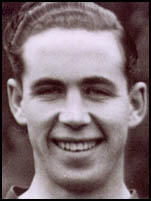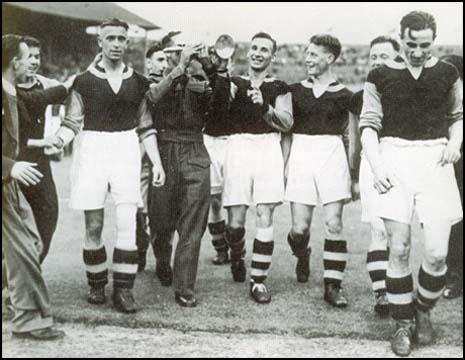Norman Corbett

Norman (Norrie) Corbett was born in Camelon, near Falkirk, Scotland, on 23rd June 1919. A talented footballer he played for Scotland Boys and captained Falkirk Boys when they won the Scottish Schools Trophy.
At the age of 15 he joined Heart of Midlothian in the Scottish League. His impressive performances for the club brought him to the attention of Charlie Paynter and he joined West Ham United in April 1937.
Corbett made his debut for the first-team as a right-half against Sheffield United on 1st May 1937. He was still a teenager and only managed six starts in the 1937-38 season, however, he became the club's regular right-half during the following season.
Other members of the team at that time included Charlie Bicknell, Joe Cockroft, Ted Fenton, Benny Fenton, George Foreman, Stan Foxall, Len Goulden, Archie Macaulay, John Morton, Ted Fenton, Sam Small, Charlie Walker and Dick Walker.
Corbett scored his first goal for West Ham United on 24th September 1938 in a 6-1 victory against Tranmere Rovers. At the time he was well-known for having one of the longest throw-ins in the Football League. His form was so good that he was expected to follow the example of his brother, Willie Corbett, and be selected for Scotland.
On Friday, 1st September, 1939, Adolf Hitler ordered the invasion of Poland. The football that Saturday went ahead as Neville Chamberlain did not declare war on Germany until Sunday, 3rd September. The government immediately imposed a ban on the assembly of crowds and as a result the Football League competition was brought to an end.
Corbett was only 20 years-old and the war severely damaged his football career. Tommy Lawton was the same age as Corbett, pointed out in his autobiography, Football is my Business: "Then came the war and, with it, the end of my career or so I felt. Surely there couldn't be room for a professional footballer in a world gone crazy? I, of course, being a young, fit man of approaching twenty would go into the services. Meanwhile, in the leisure time I had left I wound up my personal affairs, cursed Hitler and all his rats and occasionally sat down to think of what had been and what might have been."
The government imposed a fifty mile travelling limit and the Football League divided all the clubs into seven regional areas where games could take place. London clubs arranged for their regional competition to begin on the last Saturday in October. One group was composed of Arsenal, Brentford, Charlton, Chelsea, Fulham, Millwall, Tottenham Hotspur and West Ham United.
Some of the players had already joined the armed forces. Corbett for example, a former member of the Territorial Army and had joined the Essex Regiment and eventually he became a Physical Training instructor at Aldershot. West Ham decided that this was unfair on those players who were unavailable for selection. The club decided to pay all their players thirty shillings a week whether or not they played. Shortly afterwards, the Management Committee of the Football League passed a resolution instructing all clubs to follow West Ham's example.
After the declaration of war in September 1939, Adolf Hitler did not order the attack of France or Britain as he believed there was still a chance to negotiate an end to the conflict between the countries. This period became known as the Phoney War. As Britain had not experienced any bombing raids, the Football League decided to start a new competition entitled the Football League War Cup.
The entire competition of 137 games including replays was condensed into nine weeks. West Ham reached the final by beating Chelsea (3-2 and 2-0), Leicester City (1-1 and 3-0), Huddersfield Town (3-3 and 3-1), Birmingham City (4-2) and Fulham (3-2). By the time the final took place, the Phoney War had come to an end. On 10th May, 1940, Adolf Hitler launched his Western Offensive and invaded France. In the days leading up to the final, the British Expeditionary Force was being evacuated from Dunkirk.

Bicknell, Norman Corbett (in uniform), Ted Fenton, Archie Macaulay and Len Goulden.
In the final held at Wembley on 8th June, 1940, West Ham United beat Blackburn Rovers 1-0. Despite the fears that London would be bombed by the Luftwaffe, over 42,300 fans decided to take the risk of visiting Wembley. The only goal was scored by Sam Small after a shot from George Foreman had been blocked by James Barron, the Blackburn Rovers goalkeeper. It was the only medal Corbett won in his football career.
As he was based in England for the duration of the war Corbett was able to play in 96 games for the club, scoring five goals, during this period. Corbett continued to play for West Ham after the war and did not miss a game in the 1947-48 season when the club finished sixth in the Second Division. He only missed three games the following season but in 1950 he left the club to become a coach at Clapton.
Norman Corbett died in June 1990.
